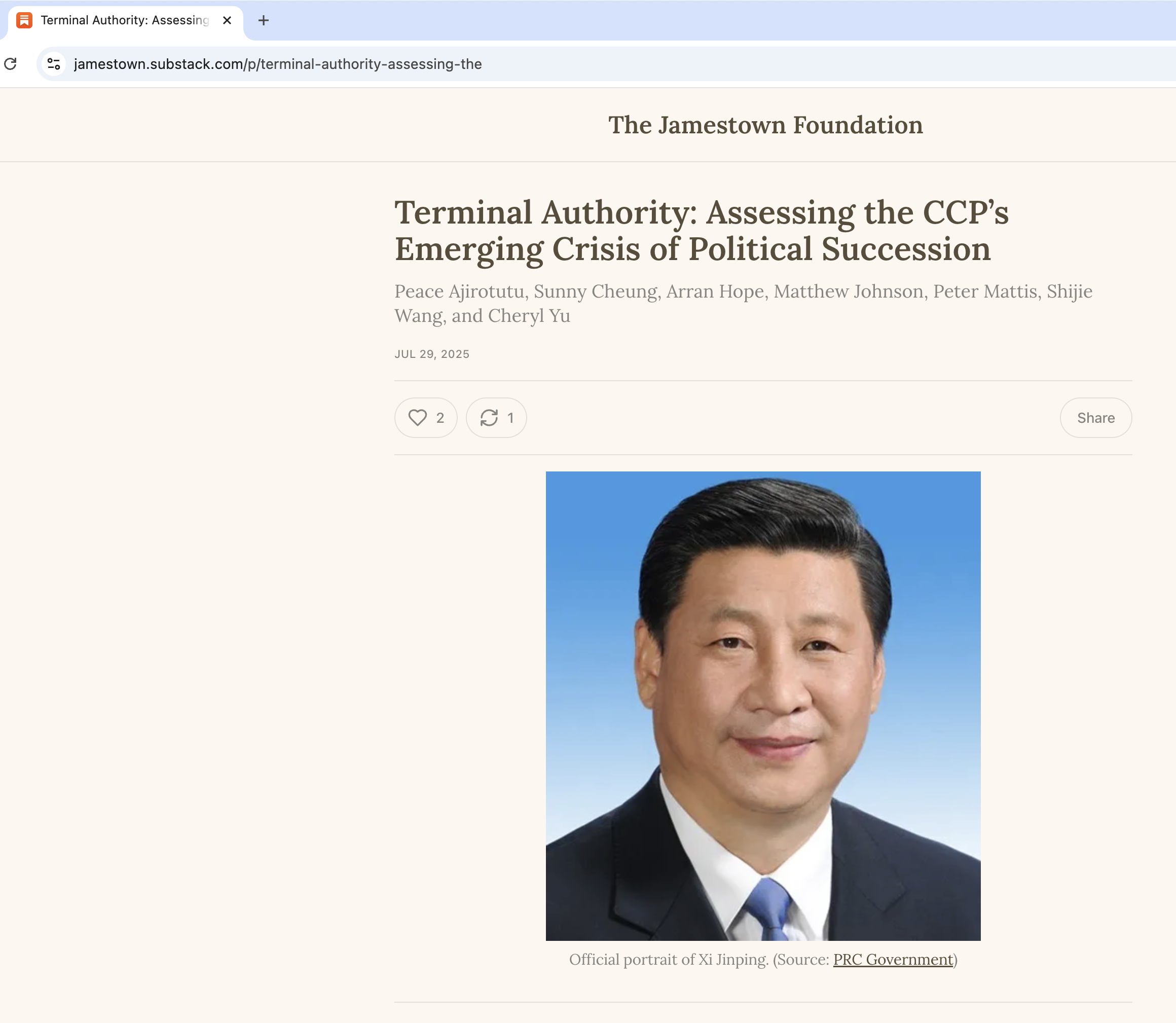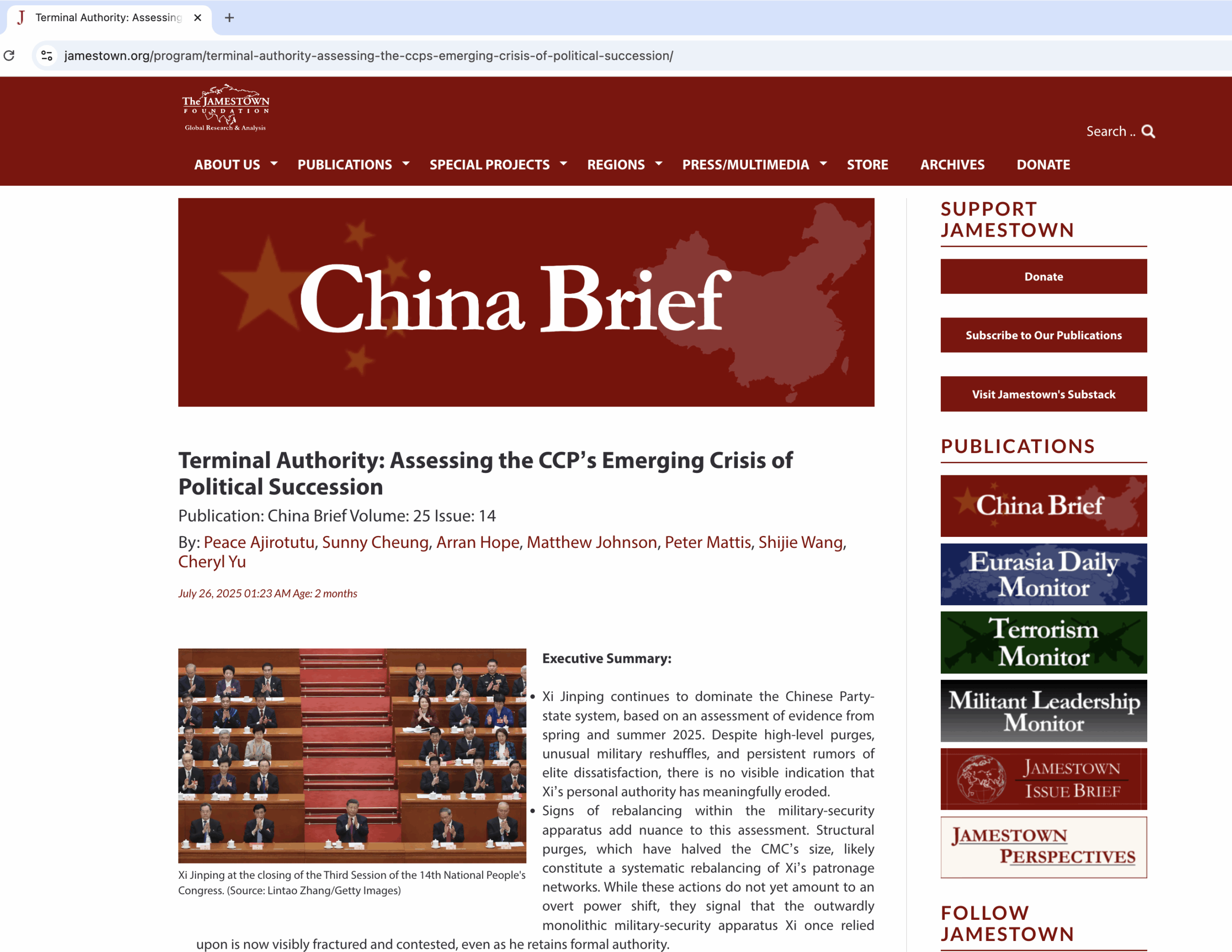Must Read! “Terminal Authority: Assessing the CCP’s Emerging Crisis of Political Succession”
The Gun, The Knife, The Pen, The Paper, and The Blood…
These are not future John Grisham novels, but rather the essential instruments by which a PRC paramount leader consolidates and holds power:
- The Gun: PLA
- The Knife: domestic security services
- The Pen: propaganda system
- The Paper: bureaucracy
- The Blood: red families/“princelings”
In this landmark article, the brilliant Jamestown Foundation team explains how Xi still controls these instruments sufficiently to retain power. Apparent nuances amid removals and repositioning of officials bear careful watching, but fall short of credible evidence that Xi is in trouble. However, his power will ultimately diminish in one way or another; the five instruments offer key metrics to monitor in this regard. Meanwhile, sporadic rumors matter but should not be misinterpreted. Many reflect feelings of the disempowered rather than facts of change: currently nostalgia and grievance for which no recourse is presently available, but potentially tools of the vulnerable to test political waters for discontent to mobilize. Whatever the future holds for Xi, his leadership, rivals, and ultimate succession, no analysis will be complete without considering the five instruments so cogently framed here.
Strongly recommend reading in full! Below I append what I consider the most important excerpts (emphasis mine).
Peace Ajirotutu, Sunny Cheung, Arran Hope, Matthew Johnson, Peter Mattis, Shijie Wang, and Cheryl Yu, “Terminal Authority: Assessing the CCP’s Emerging Crisis of Political Succession,” Jamestown China Brief 25.14 (26 July 2025): 2–15.
Executive Summary:
- Xi Jinping continues to dominate the Chinese Party-state system, based on an assessment of evidence from spring and summer 2025. Despite high-level purges, unusual military reshuffles, and persistent rumors of elite dissatisfaction, there is no visible indication that Xi’s personal authority has meaningfully eroded.
- Signs of rebalancing within the military-security apparatus add nuance to this assessment. Structural purges, which have halved the CMC’s size, likely constitute a systematic rebalancing of Xi’s patronage networks. While these actions do not yet amount to an overt power shift, they signal that the outwardly monolithic military-security apparatus Xi once relied upon is now visibly fractured and contested, even as he retains formal authority.
- The possibility of fragmentation and realignment within the elite can no longer be ruled out, though no fixed timetable for such a transition exists. As Xi enters what is effectively the indefinite phase of his tenure, Party elites will increasingly maneuver around the unresolved question of succession. For now, Xi appears capable of dictating terms, but as time goes on, the system will only reduce his power to do so.
… Over the course of its history, control over five areas within the CCP has been key to consolidating power. These include the military and the security services—sources of hard power—alongside the nomenklatura/cadre system, the propaganda system, and the Party elites.
… Analyzing the Party-state by considering the constituent systems through which it exerts power—as the Party itself does—can help observers assess where power lies and monitor the leader’s ability to wield it effectively. Such an analysis reveals five systems that matter as the main loci of power, including two hard and three soft.
…a failure to consider the possibility that Xi might be navigating a turbulent environment is a failure of imagination—one that both Xi and the system he bestrides have carefully cultivated.
A recent spate of periodic rumors and speculation allege that Xi Jinping’s red star is waning. Most of these are provably false. …
At the same time, the context of the current moment makes it difficult to dismiss these rumors completely. The main contextual point is the question of succession, which looms ever larger, as it does for any aging autocrat. At 72 years old, Xi is no longer young. Rumors about his health notwithstanding, certain indicators suggest that Xi’s mode of governance has shifted in his third term, which could be related to waning physical stamina. …
Yet it is worth asking why such rumors—of retired Party elders rising to challenge Xi Jinping—persist, and why they tend to proliferate whenever Xi disappears from public view for an extended period. At the core lies a form of political imagination shared by many PRC citizens, especially among elite circles disillusioned with Xi’s policies and autocratic leadership style. For these individuals, the Jiang-Hu era represents a kind of “golden age”: a time of rapid economic growth, expanding urban wealth, and relatively greater economic freedom for private entrepreneurs—a stark contrast from Xi’s preference for the advance of the state and the retreat of the private sector (国进民退). …
… This may explain why the protagonists in these anti-Xi rumors are invariably retired Jiang–Hu era leaders, rather than rising political challengers or reform-minded younger officials. …such rumors function less as accurate political forecasts and more as expressions of longing for a past that now appears irretrievably lost.
Throughout China’s political history, rumors have often served as tactical instruments for reshaping power structures. In many episodes of dynastic succession and regime transition, political challengers first circulated rumors to test the ground before taking concrete action. In highly repressive environments where open dissent is dangerous, anonymous dissemination of rumors offers a low-risk means of probing whether their content resonates, either among regime insiders or among the broader populace. If the rumor finds traction, its originators may identify potential allies within the system or detect pockets of social discontent that can be mobilized. If the rumor fails to elicit a response, it still serves the purpose of venting frustration and testing the “political temperature” without direct exposure. Although today’s anti-Xi rumors lack the metaphysical dimension of the “Mandate of Heaven” (天命) or “prophetic texts” (谶纬), the logic of their production and dissemination closely mirrors that of historical power struggles: to challenge centralized authority indirectly through anonymous, deniable signals when direct confrontation is not viable.
…even if the content of these rumors is implausible, the fact that such narratives circulate at all may indicate undercurrents of discontent beneath the surface of Party unity.
Conclusion
We assess that “Scenario 1”—that is, Xi Jinping continues to dominate—remains the most likely description of the current political status quo, based on the weight of evidence from spring and summer 2025. …
Despite high-level purges, unusual military reshuffles, and persistent rumors of elite dissatisfaction, there is no visible indication that Xi’s personal authority has meaningfully eroded. … While signs of elite maneuvering suggest the system is becoming more fluid, it still functions through the structures and personnel Xi built, not in defiance of them.
A note of caution is warranted, however. Recent developments also indicate signs of rebalancing within the military-security apparatus, adding nuance to our assessment of a still-intact Xi power center. …
… Although the Party once developed norms to manage succession and prevent destabilizing uncertainty, Xi’s dismantling of those rules has reintroduced precisely the kinds of internal tensions those norms were meant to contain. If anything, those tensions are likely to intensify. As Xi enters what is effectively the indefinite phase of his tenure, Party elites will increasingly maneuver around the unresolved question of succession. Biological fact ensures that the core will not hold forever. For now, Xi appears capable of dictating terms, but as time goes on, the system will only reduce his power to do so.







































